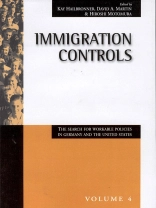Some of the most pressing questions in immigration law and policy today concern the problem of immigration controls. How are immigration laws administered, and how are they enforced against those who enter and remain in a receiving country without legal permission? Comparing the United States and Germany, two of the four extended essays in this volume concern enforcement; the other two address techniques for managing high-volume asylum systems in both countries.
Tabella dei contenuti
Introduction
Kay Hailbronner and Hiroshi Motomura
Chapter 1. The Obstacles to Effective Internal Enforcement of the Immigration Laws in the United States
David A. Martin
Chapter 2. Internal Controls and Actual Removals of Deportable Aliens: the Current Legal Situation in the Federal Republic of Germany
Hans-Joachim Cremer
Chapter 3. The New Techniques for Managing High-Volume Asylum Systems
Stephen Legomsky
Chapter 4. New Techniques for Rendering Asylum Manageable
Kay Hailbronner
Conclusion: Immigration Admissions and Immigration Controls
Kay Hailbronner, David A. Martin and Hiroshi Motomura
Notes on Contributors
Bibliography
Index
Circa l’autore
Kay Hailbronner is professor of international law, European law, and constitutional law at the University of Konstanz and director of the Research Center of European and International Law of Immigration and Asylum at that institution. He is the author of numerous books and articles on immigration and asylum matters, among them Current Asylum in Germany (University of California, Berkeley, 1995).












